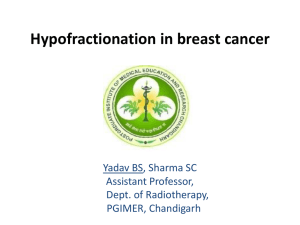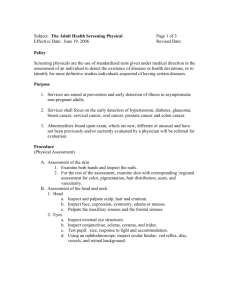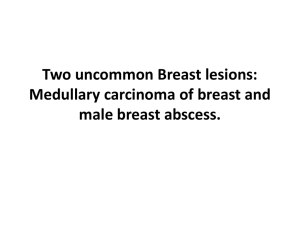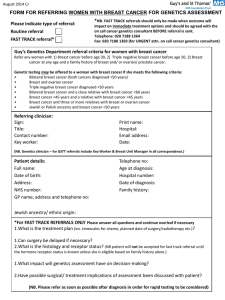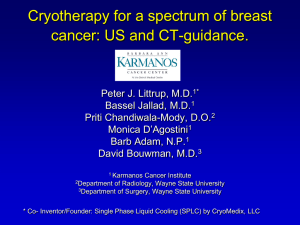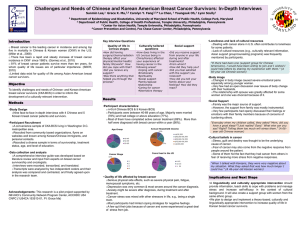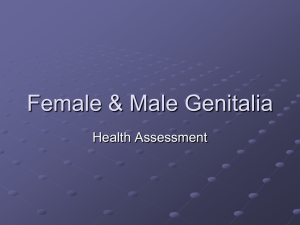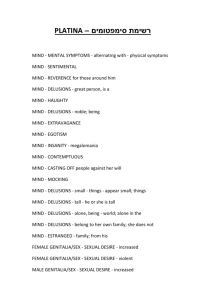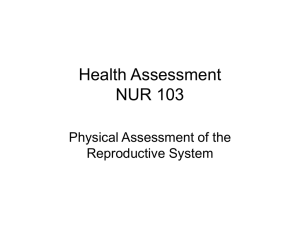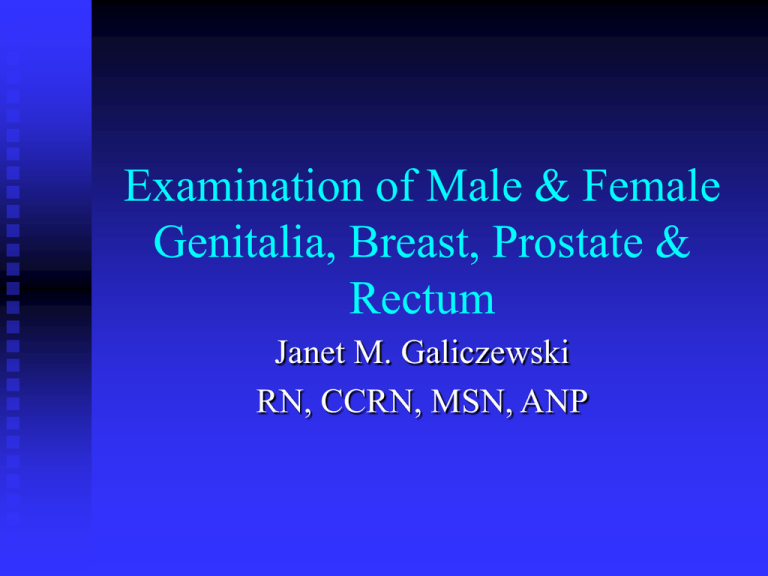
Examination of Male & Female
Genitalia, Breast, Prostate &
Rectum
Janet M. Galiczewski
RN, CCRN, MSN, ANP
Breast A& P
Breast overlies pectoralis major.
Breast is a hormonally sensitive tissue.
Upper Outer Quadrant-site of most breast cancers.
Breast composed of glandular tissue, fibrous tissue
including suspensory ligaments, adipose tissue.
Proportion varies with age, cycle, pregnancy,
lactation, & general nutrition.
Suspensory ligaments (Cooper’s Ligaments)
support breast tissue, contract in CA breastproduce pits or dimples in overlying skin.
Breast Lymphatics
Central
Pectoral (Anterior)
Subscapular (Posterior)
Lateral
Breast Cancer Risk Factors
Family History
Menstrual History
Pregnancy
Age
Sex
Education & Income
Location
Caucasian Women
A Good History is
imperative
Techniques of Breast Exam.
Inspection:
Pt sitting, disrobed to the waist,arms at
sides.
Inspect breasts, note appearance of skin;
color, redness from infection or
inflammatory CA.
Size & symmetry of breasts
Contour
Technique of Breast Exam.
Inspect nipples; note size & shape, direction
in which they point, rashes or ulceration,
discharge.
Assess breast development according to
Tanner.
Check for dimpling or retraction.
Exam (Cont).
Palpation:
Ask pt. to lie down
Bring pts arm overhead, use pads of first
three fingers, compress tissue gently.
Use a pattern: concentric circles (or other
method).
Note: Consistency of tissues, tenderness,
nodules.
If you find a nodule:
Location
Size
Shape
Consistency
Movable
Distinctness
Nipple
Lymphadenopathy
Exam (cont)
Palpate each nipple.
Compress the areola with your index finger
& thumb, watch for discharge.
Male Breast: Monthly exam (self), clinical
exam every 1-3 years.
Inspect nipple & areola for nodules,
swelling, ulceration.
Palpate the areola for nodules.
Breast Cancer Screening
Encourage bilateral self - breast exams
monthly. 5-7 days after onset of menses.
They should continue after menopause.
Age 20-39 CBE every three years.
=/> 40 CBE yearly along with
mammography.
For women at increased risk mammography
should be initiated at 30 years of age.
After 70 the benefits of mammography is
less well defined.
Save a Life
Cumulative lifetime
risk factor for
developing BREAST
CANCER is :
1
in 7
Choose to be
proactive!!
Choose to Live!!
Female Genitalia A&P
Labia Majora
Labia Minora
Vestibule
Introitus
Perineum
Urethral Meatus
Skene’s Glands
Bartholin’s Glands
Female Genitalia (Internal)
Vagina
Uterus
Cervix
External Os
Fallopian Tubes
Ovaries; Adnexa
Internal Female Genitalia
Examination
Empty Bladder
Position & Drape Appropriately
Inspect external genitalia; separate labia majora &
inspect
Labia minora
Clitoris
Urethral meatus
Introitus
Note:inflamm.,ulceration,
discharge,swelling,nodules,palpate any lesions.
If you suspect urethritis or inflammation of
the paraurethral glands (Skene’s): Insert
index finger into vagina, milk urethra gently
from inside outward.
May be R/T chlamydia or gonorrhea, get
culture.
Internal Exam.
Locate the cervix
Assess support of the vaginal wall
Cystocele
Uterine Prolapse
Rectocele
Insert Speculum
Inspect Cervix & Os
Pap Smear
Exam (cont).
Perform a Bimanual exam.
Palpate the cervix
Palpate the uterus
Retroversion of the uterus
Palpate Each Ovary
Rectovaginal Exam
Male Genitalia A & P
Shaft of the penis
Glans
Prepuce/foreskin
Urethra
Urethral meatus
Scrotum
Testes
Male Genitalia
Inguinal canal
External Inguinal ring
Inguinal Hernias
Femoral Hernias
Prostate
Prostate
Examination of Male Genitalia
Penis
Inspection
Foreskin,smegma, phimosis, paraphimosis.
Glans; hypospadias
Palaption palpate shaft between thumb & 1st 2
fingers; feel for induration along ventral
surface.
Scrotum
Inspection
Palpation
Testicular Cancer (See Handout)
Examination of Male Genitalia
Transillumination of the scrotum
Hydrocele
Hernias: Inguinal & Femoral
Inspection
Palpation
Prostate Examination
Note:
Size:2.5cm x 4 cm wide
Shape:heart with palpable central groove
Consistency: elastic, rubbery
Nodules
Tenderness: nontender to palpation
Mobility: slightly mobile
Should not protrude more than 1 cm into rectum
Anus & Rectum
Anal canal surrounded by 2 layers of
muscle called sphincters
Internal sphincter is under involuntary
control.
External sphincter is under voluntary
control.
Examination of the Anus &
Rectum
Inspect saccrococcygeal & perianal areas for:
Lumps
Ulcers
Inflammation
Rashes
Excoriation
Hemorrhoids
Venereal warts
Herpes
Hemorrhoid
Examination of the Anus &
Rectum
Examine sphincter tone of the anus; Note:
Tenderness
Induration
Irregularities
Insert finger clockwise & counterclockwise
Note; nodules, irregularities, induration
Stool for occult blood (Guiac)



